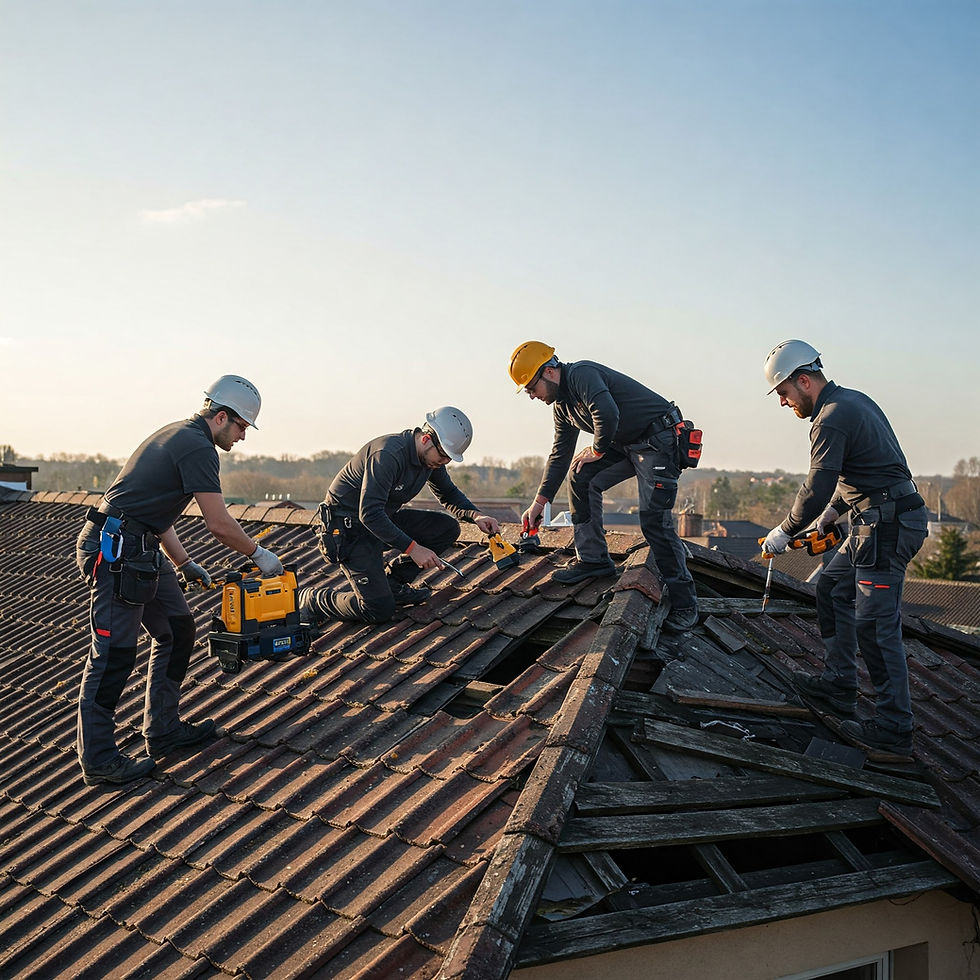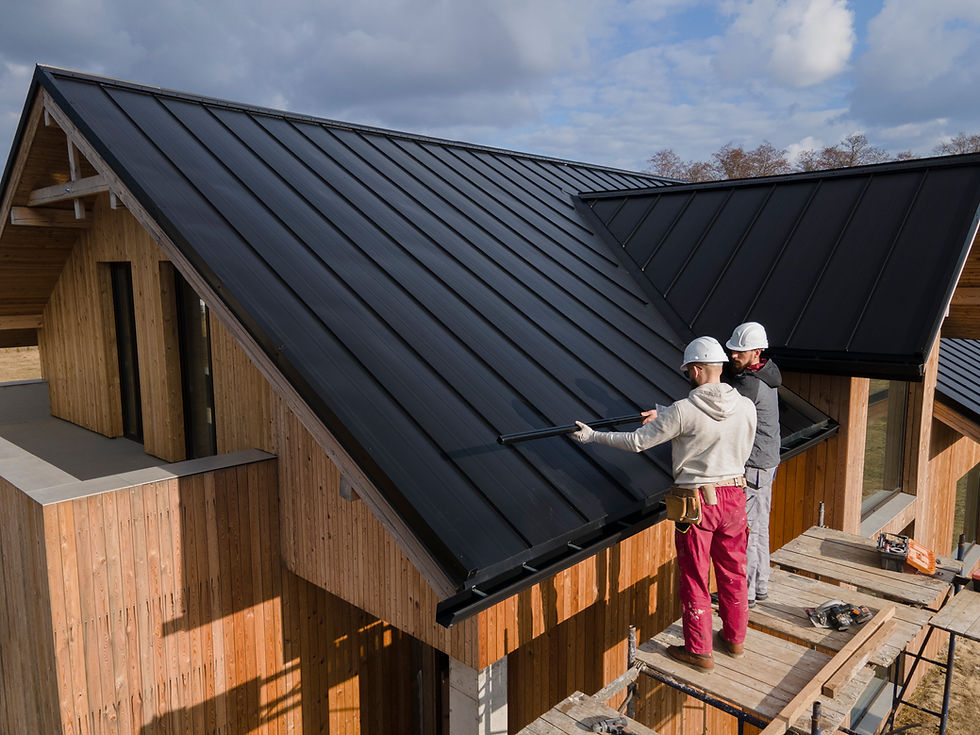Top Questions to Ask Before Hiring a Roofing Contractor
- montajulunitelsear
- Aug 13
- 4 min read
Choosing the right roofing contractor is one of the most important decisions for your property. Whether you need urgent roof repairs, emergency roofing, or a complete roof replacement, the contractor you select will directly affect the quality, safety, and lifespan of your roof.
Hiring the wrong person could lead to substandard work, costly future repairs, and unnecessary stress. To help you make an informed choice, here are the essential questions to ask before committing to any roofer.

1. Are You Licensed and Insured?
This should be your first question. A reputable roofing contractor will have the necessary licences to operate in your area. Licensing shows they meet local building standards and regulations.
Equally important is insurance. They should have public liability and worker’s compensation cover. This protects you from financial liability in case of property damage or injuries during the work.
2. What Experience Do You Have with My Type of Roof?
Not all roofs are the same. Some contractors specialise in tiled roofs, others in slate or metal roofing. If you need heritage roof repairs or specific styles, you should confirm the roofer has relevant experience.
If you are considering roof replacements, ensure the contractor has successfully completed similar projects before. This experience minimises mistakes and ensures a smooth installation.
3. Can You Provide References or a Portfolio?
Good roofers are always happy to showcase their past work. Ask for before-and-after photos of previous roof repairs and replacements. Even better, request the contact details of past clients.
Speaking to previous customers can reveal whether the contractor meets deadlines, communicates well, and delivers quality results.
4. What Is the Timeline for the Project?
Timeframes are important, especially for emergency roofing. Ask for a clear schedule that includes start and completion dates. Delays can happen due to weather, but a professional roofing contractor will keep you informed and update the plan accordingly.
If you are running a business, a commercial roofing project may require work outside of normal hours to avoid disruption.
5. Do You Offer Written Estimates and Contracts?
Never rely on verbal agreements. Ask for a detailed written estimate that includes material costs, labour, and any additional fees. This prevents surprises when the final invoice arrives.
A formal contract should clearly state the scope of work, payment terms, warranty details, and expected completion date. This protects both you and the contractor.
6. What Materials Do You Recommend and Why?
The choice of materials can make a huge difference in the durability and appearance of your roof. Your contractor should explain the pros and cons of each option, including lifespan, weather resistance, and maintenance requirements.
For roof replacements, high-quality materials may cost more initially but can save you money in the long run by reducing repair needs.
7. How Will You Protect My Property During the Job?
Roof repairs and replacements can be messy. Ask how the contractor plans to protect your landscaping, driveway, and other parts of your property during the work.
Professional roofers often use tarps, scaffolding, and safety barriers to prevent damage and keep the site tidy.
8. Who Will Supervise the Work?
In larger roofing companies, the person who gives you the quote may not be the one doing the job. Make sure you know who will be on site and supervising the team.
Direct communication with the project manager ensures smooth progress and quick resolution of any issues.
9. Do You Provide a Warranty?
A warranty shows confidence in workmanship and materials. Ask whether the warranty covers both labour and materials, and for how long.
Good roofing contractors offer at least a few years of coverage for repairs and much longer for full roof replacements. This gives you peace of mind should any issues arise.
10. How Do You Handle Unforeseen Issues?
Sometimes, once a roof is opened up, unexpected problems such as rotting timber or hidden leaks are discovered.
Ask the contractor how they will handle such situations and whether they will pause work, provide a revised quote, and seek your approval before continuing.
11. Do You Handle Permits and Regulations?
Roofing work often requires local council permits or compliance with building codes. A professional roofing contractor should manage this process for you, ensuring everything is legal and safe.
Failing to secure permits can result in fines or the need to redo the work, which adds cost and delay.
12. Are You Available for Emergency Roofing Services?
Storm damage and sudden leaks require urgent attention. Ask whether the contractor provides 24/7 emergency roofing services.
Quick action can prevent water damage, structural issues, and expensive repairs. Having a roofer who offers emergency support can be a valuable long-term relationship.
13. What Is Your Payment Schedule?
Reputable roofers do not demand full payment upfront. A typical payment plan might include a deposit, followed by staged payments as work progresses, and a final payment upon completion.
This arrangement ensures you pay for results, not promises.
14. How Do You Ensure Safety on Site?
Roofing is high-risk work. Contractors should follow strict safety procedures, including the use of harnesses, scaffolding, and protective equipment.
Safe work practices not only protect the workers but also reduce the risk of accidents on your property.
15. Can You Offer Advice on Maintenance?
A reliable roofing contractor should provide tips on maintaining your roof to extend its life. This might include cleaning gutters, checking for damaged tiles, and scheduling regular inspections.
Proactive maintenance can delay the need for major roof repairs or replacements.
Conclusion
Choosing the right roofing contractor is not just about price; it’s about trust, skill, and reliability. By asking these essential questions, you protect yourself from poor workmanship, hidden costs, and unnecessary stress.
Whether you need roof repairs, emergency roofing, or a complete roof replacement, a qualified and transparent contractor will deliver lasting results and peace of mind.



Comments